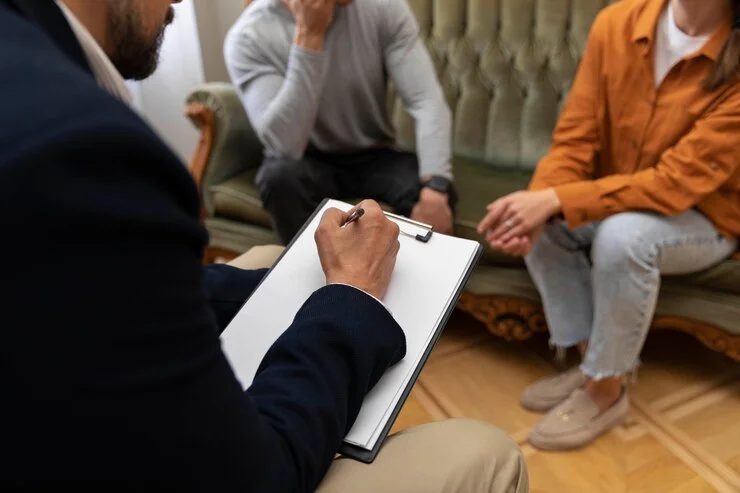-
129, Block-A Bangur Avenue, Mousumi Appartment, Kolkata 700055
129, Block-A Bangur Avenue, Mousumi Appartment, Kolkata 700055

Wondering if your relationship needs marriage counseling? Learn the warning signs and how marriage counseling can help improve your relationship from a professional psychological counselor.

Marriage is a beautiful bond, but like any relationship, it requires effort, understanding, and patience. However, over time, couples can experience challenges that may seem insurmountable. If you’re noticing certain warning signs in your relationship, it might be time to consider marriage counseling. Addressing these issues early on can prevent further strain and promote healthier, happier relationships.
In this post, we’ll explore the warning signs that may indicate your relationship could benefit from professional marriage counseling. If you’ve been wondering about the health of your marriage and whether counseling could help, understanding these signs can guide you toward making the right decision.

While every marriage goes through ups and downs, there are certain patterns and behaviors that suggest a deeper issue might be at play. Here are some of the most common warning signs you should be aware of:
One of the most obvious warning signs that your marriage may need counseling is constant arguing. If you and your partner seem to be stuck in a cycle of disagreements that go unresolved, it can lead to frustration and resentment. Poor communication is often at the root of these conflicts, making it difficult to express feelings and understand each other’s perspectives.
Signs to watch for:
Intimacy is a key component of a healthy marriage. When emotional and physical closeness begins to diminish, it can create a sense of distance. If you find yourselves growing apart, it’s essential to recognize it early before it leads to further isolation.
Signs to watch for:
Trust is the foundation of any relationship. If trust has been broken—whether through infidelity, dishonesty, or other forms of betrayal—it can be difficult to rebuild. However, addressing these trust issues with marriage counseling can help you understand the underlying causes and work toward healing.
Signs to watch for:
Feeling neglected or unimportant in a relationship can lead to emotional distress. If one partner feels they are not receiving the care, attention, or love they need, it can result in resentment and feelings of abandonment.
Signs to watch for:
If criticism becomes a regular part of your interactions, it can erode the foundation of your marriage. Constantly pointing out flaws and expressing contempt towards one another damages self-esteem and the emotional bond. Healthy relationships are built on mutual respect, and this behavior indicates a need for counseling.
Signs to watch for:
If you both feel stuck or dissatisfied with the marriage but aren’t sure how to fix it, marriage counseling can provide the support you need. Feeling unhappy without knowing the cause could suggest unresolved issues that require external help to address.
Signs to watch for:
If you’ve noticed any of the above signs in your marriage, it’s crucial to seek professional help. Marriage counseling provides a safe, neutral space for both partners to express their feelings and concerns without fear of judgment. Here’s how marriage counseling can improve your relationship:
A professional marriage counselor helps couples communicate more effectively, teaching active listening and conflict resolution techniques that help reduce misunderstandings.
Marriage counseling offers tools for rebuilding trust after infidelity or betrayal. Through therapy, couples can work through the pain and take steps toward forgiveness and trust rebuilding.
A counselor can help couples reconnect emotionally by addressing their needs and desires, improving the emotional bond that may have been neglected.
Sometimes, the problems in a marriage stem from deep-seated issues such as childhood trauma, unresolved personal conflicts, or unrealistic expectations. Marriage counseling allows couples to address these issues together.
Marriage counseling helps couples set healthy boundaries that promote mutual respect and emotional well-being. This is especially important for couples who feel overwhelmed by each other’s demands.

Q1: How long does marriage counseling take?
Marriage counseling can vary in length, depending on the issues being addressed. Some couples may only need a few sessions, while others might require several months of therapy to resolve deeper issues.
Q2: Is marriage counseling only for couples who are on the brink of divorce?
Not at all. Marriage counseling can benefit couples at any stage of their relationship. It’s useful not only for repairing a marriage but also for enhancing communication and preventing future problems.
Q3: Can marriage counseling help with infidelity?
Yes, marriage counseling can help couples heal after infidelity by working through the hurt, rebuilding trust, and establishing healthier patterns of behavior moving forward.
Q4: Will my partner be forced to attend marriage counseling?
No, marriage counseling works best when both partners are willing participants. If one partner is reluctant, a counselor may still be able to help the other partner explore their feelings and make informed decisions about the future of the relationship.
Q5: How do I know if marriage counseling is working?
Signs that marriage counseling is working include better communication, a renewed sense of trust, a stronger emotional connection, and a more balanced relationship. Progress is often gradual, so patience is important.
Recognizing the warning signs in your marriage early on can save both partners a great deal of emotional pain. If you’re experiencing challenges in your relationship—whether through communication breakdowns, trust issues, or emotional disconnection—marriage counseling with the Best psychological counselor in Kolkata can provide the support and guidance needed to work through these problems.
While it might feel daunting to seek help, marriage counseling is a proactive step toward building a stronger, healthier, and more fulfilling relationship. Remember, seeking help from a qualified professional is not a sign of failure, but a powerful step towards improving your connection and creating a more harmonious future together.
If you’re noticing these warning signs, don’t hesitate to seek help from a marriage counselor. Taking that first step could be the key to a better, happier relationship.